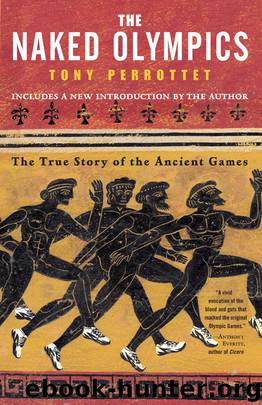The Naked Olympics by Tony Perrottet

Author:Tony Perrottet [Perrottet, Tony]
Language: eng
Format: epub
ISBN: 978-1-58836-382-4
Publisher: Random House Publishing Group
Published: 2012-06-25T16:00:00+00:00
AS TRUMPETS SOUNDED, the charioteers entered the Hippodrome in a splendid single-file procession, the horses high-stepping around the track. The riders held the reins in the left hand; in the right, they carried whips or goads—long sticks with bells or jingles on the end. One by one they would approach the judges in the company of the chariot owner. Heralds proclaimed the name of each competitor, his father, and his city, then asked if anyone in the crowd had any charge to bring against him. At the end of this, the head judge gave a long-winded address to the assembled group. Finally, each charioteer drew a lot from a ceremonial urn and cantered off to take his position in the starting gate—which happened to be one of the strangest contraptions in sporting history.
Called the aphesis, Olympia’s starting gate was a typically ingenious Greek solution to a perennial racing problem. At other top-ranking tracks like Delphi and Corinth, chariots simply started in a line at the sound of a trumpet, which meant that vehicles at the end had to run farther to reach the first turning post—a critical disadvantage in any race. To promote fairness, an Athenian inventor named Kleotas designed a gate in the shape of an enormous triangle. It protruded onto the turf like a ship’s prow, with booths for each chariot and an elaborate crank system that opened the forty gates in reverse order, letting the last charioteers burst onto the track first. This clockwork creation made practical use of the Greek advances in geometry: By staggering the start, every chariot had a more or less equal chance of reaching the first post, eliminating the insider’s advantage. Judging from ancient descriptions, the aphesis was a strange and wonderful sight, decorated with a bronze dolphin and a gleaming eagle that were both part of the working mechanism. Naturally, it took time for charioteers to negotiate their way into their designated gates, adding to the excitement in the crowd. Old men, former drivers, boasted of their own experiences; others recalled the advice of King Nestor to his son in Homer’s Iliad—that it is not always the fastest horses that win a race; the skill of the charioteer is paramount:
Download
This site does not store any files on its server. We only index and link to content provided by other sites. Please contact the content providers to delete copyright contents if any and email us, we'll remove relevant links or contents immediately.
| Africa | Americas |
| Arctic & Antarctica | Asia |
| Australia & Oceania | Europe |
| Middle East | Russia |
| United States | World |
| Ancient Civilizations | Military |
| Historical Study & Educational Resources |
The Daily Stoic by Holiday Ryan & Hanselman Stephen(3297)
The Fate of Rome: Climate, Disease, and the End of an Empire (The Princeton History of the Ancient World) by Kyle Harper(3055)
People of the Earth: An Introduction to World Prehistory by Dr. Brian Fagan & Nadia Durrani(2726)
Ancient Worlds by Michael Scott(2675)
Babylon's Ark by Lawrence Anthony(2666)
The Daily Stoic by Ryan Holiday & Stephen Hanselman(2564)
Foreign Devils on the Silk Road: The Search for the Lost Treasures of Central Asia by Peter Hopkirk(2454)
India's Ancient Past by R.S. Sharma(2448)
MOSES THE EGYPTIAN by Jan Assmann(2411)
The Complete Dead Sea Scrolls in English (7th Edition) (Penguin Classics) by Geza Vermes(2269)
Lost Technologies of Ancient Egypt by Christopher Dunn(2219)
The Earth Chronicles Handbook by Zecharia Sitchin(2216)
24 Hours in Ancient Rome by Philip Matyszak(2074)
Alexander the Great by Philip Freeman(2061)
Aztec by Gary Jennings(2019)
The Nine Waves of Creation by Carl Johan Calleman(1906)
Curse Tablets and Binding Spells from the Ancient World by Gager John G.;(1858)
Before Atlantis by Frank Joseph(1847)
Earthmare: The Lost Book of Wars by Cergat(1817)
